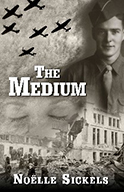THE CHARACTERS
- Helen has a variety of feelings about her psychic abilities. Are they all understandable & believable? How do you think you’d feel in her place?
- The 1940’s are often spoken of as a time of innocence in America. Does that description fit the characters in THE MEDIUM?
- Did the characters behave as you expected them to in different situations? Did any of them do anything that surprised you?
- How do Helen and Rosie influence each other?
- If Billy had lived, do you think he and Helen would have been happy together? Would they have had a successful marriage? Do you think Lloyd is a better match for her?
- How does Ursula influence Helen? Do you think Ursula considers it a good thing or a misfortune that Helen loses her abilities?
- What do you think Helen will be like in the future, as she gets older? What shape will her life take?
THE STORY
- In what way is THE MEDIUM a coming-of-age story?
- How did you feel about the ending of the book? Were you satisfied with it or would you have liked it to end differently?
- What did you like or dislike about the style of the writing in THE MEDIUM?
YOU, THE READER
- Were your own views about death and the afterlife effected by reading THE MEDIUM? What is your opinion of Helen’s and Ursula’s beliefs about these things?
- What do you think you would have liked and disliked about living in the time period of the novel?
- How does the World War II home front experience compare to our present-day experience of the wars in Iraq and Afghanistan and the so-called war on terrorism?
- Could you relate to the characters’ predicaments or circumstances?
An Author's Appreciation of Book Groups
Writing is both an extremely solitary occupation and an activity that presupposes the existence of an other --- the unknown reader. I don’t write to seduce or even, necessarily, to please this reader; nevertheless, by the very nature of writing, I am constantly addressing her, inviting her to walk with me a while, to trust me enough to follow my map even if the ground is familiar, to see what I notice and listen to what I hear, to open her heart to invented pains and joys as fully as she does to those in real life.
The kind of readers who join book groups are the perfect hiking companions through a writer’s claimed landscape. Metaphorically speaking, they know enough of botany and geology to appreciate the curve of the hills, the shadowy undergrowth of the fens, and the sweep of the beaches. They see the forest and the trees. They have, too, a firm purchase on human nature, both their own and various fictional representations of it, so they are able to judge a story’s people (and a person‘s story) with acumen and sympathy.
But above all else, they care. They take the time and the energy needed for caring and give it to a book as they would to a friend. They invest their reading and their discussions of what they have read with true passion. They’re willing to spend their emotions and their intellect with openhanded generosity. A casual observer of one lively book group meeting remarked with amazement on the involvement of the members with the book at hand, as if, he said, the characters under discussion were “real people they knew.”
It seems to me that the members of book groups think like writers. They are acute observers. To each book, they bring what they already know of both books and life, and, as importantly, they bring an openness to learning something new --- not learning in a dull, moralistic sense, but learning as discovery. They are willing to let what is unformed within them well up and take shape in answer to words on a page. Indeed, they invite this to happen. For the writer, these things occur as the words come out; for the reader, they occur as the words go in. The book group member then takes an extra step, entering with a kind of joyous bravery into the fray of explaining her reactions, harnessing yet more words --- her own and those of her fellow members --- to expand and extend the reading experience, and, in an intangible but substantial way, the book itself.
I have modest aspirations. I do not covet a place on the best-seller list, nor a movie of the week. What I want for my writing is an engaged audience. (Not, perhaps, such a modest aspiration after all.) Engaging them is part of my job, of course, but it’s a great boost to my spirits to know that readers exist who fervently seek engagement --- readers who will bring to my work as deep an attention as I spent in producing it.
I don’t know who will pick up the anthology that contains my short story, when someone will read my poem in a literary journal, or where someone will curl up with my novel. I cannot know, either, what personal experiences, bitter and sweet, those readers carry in their backpacks as they trudge through my contrived territory, nor how they will spread their own meaning on my tale --- whether they will choose to lay their bedrolls on granite or on moss. What I do know is that if this reader --- this intimate stranger --- is in a book group, half the battle is won, for critical but patient ears and eyes will be turned my way. Private lives will be suspended for a brief span to make room for the lives I have devised. I couldn’t ask for more. I don’t.
So, to all book group members everywhere, leaning across crumb-strewn tables toward one another or circled in a living room with books open on your laps and arguments or laughter in the air, I say, keep up the good work. For it is work, and it is good, what you are doing. Even if the authors you discuss never know a single word of what you say, even, in fact, if the authors are dead, you are contributing to their vitality and to the longevity and reality of their creations. You are patrons of the arts, spending the invaluable coin of your minds and your sentiments. Actions may speak louder than words, but words matter. They matter very much. Book groups stand witness to that.
A longer version of this essay appeared in The Book Group Book, edited by Ellen Slezak, 1995 & 2000, and in the journal, Fiction and Friends, edited by Natalie Kemmitt, 1999

Copyright © 2015 - 2017 Noëlle Sickels | site design by
All photography is the original work of Annie Carmona and cannot be copied or reproduced without permission.


